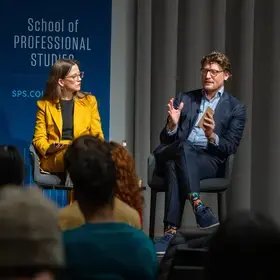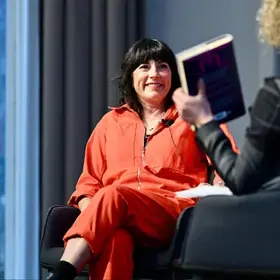The rise of political polarization is detrimental not only to dialogue and communication but also to our very democracy.
On March 27, the Columbia University School of Professional Studies (SPS) hosted a panel discussion on communication challenges through the scholar-practitioner lens of strategic communication, negotiation and conflict resolution, and narrative medicine. The event, part of the Dialogue Across Difference initiative, was aimed at sharing research and practices that foster connections, facilitate dialogue, and strengthen democratic practices.
The discussion was moderated by Dr. Kristine Billmyer, director of the Strategic Communication program, and Dr. Beth Fisher-Yoshida, director of the Negotiation and Conflict Resolution program. The panel was composed of Ashley All (’23SPS, Strategic Communication), president of the Kansas Coalition for Common Sense and senior advisor of Families United for Freedom; Clarence Coaxum (’11SPS, Negotiation and Conflict Resolution), associate director of finance and administration at the Society of Fellows and Heyman Center for the Humanities at Columbia University; and Dr. Danielle Spencer, senior lecturer in the Narrative Medicine program.
Reframing Conflict: Five Dimensions of Dialogue
Coaxum introduced the five dimensions of dialogue formulated by scientist David Bohm, who saw dialogue as a way of collectively observing how our behavior is controlled by hidden values and intentions, as well as how unnoticed cultural differences can clash without our awareness.
Bohm views dialogue in varied ways: as conversation, as inquiry, as creation of a shared meaning, as a participatory process, and as a collective form of meditation. “The purpose is not to solve a problem or come to an agreement,” Coaxum explained. “Rather, take what the process gives us. There are no authority figures, and all participants are viewed as equals.”
Coaxum said effective dialogue can take place only when all participants listen to one another without prejudice and without trying to convince others that their position is the correct one.
Coaxum said some ways that participants can do this are by:
- Allowing space for each person to talk
- Thinking about what their personal investment is in the process
- Suspension of thought, judgment, and impulses
- Active listening
“The participants should position themselves to actively listen,” he said. “That is, do not hear the message through your thought process, but hear the message as it is conveyed.”
Strategic Communications in Political Settings
All, who has been a communication and political strategist for 20 years, spoke about her experience in the defense of reproductive rights. In 2022, All worked with Kansans for Constitutional Freedom as communication director and spokesperson when it won a historic landslide victory in a vote to uphold abortion rights that followed the fall of Roe v. Wade. She has also worked on campaigns to defend reproductive rights in Kentucky, Montana, Michigan, and Ohio.
“The communications objective that we set together was to win while still embracing our values,” she said. “Listening to each other was paramount. That was critical in building a shared understanding of the electorate and a shared appreciation for the importance of language and words.”
All emphasized that giving coalition partners ample time to share their perspectives and work through their differences was important to their success.
“That was not always easy. There were tense moments for sure. But that’s why the framework of strategic communications and the research component is so important. It was essential to building consensus within the coalition. We were able to work through those differences together,” she said.
Navigating Difficult Conversations via Narrative Medicine
Dr. Spencer shared ways that narrative medicine can facilitate effective communication. Narrative medicine refers to health care practiced with the narrative skills of recognizing, absorbing, interpreting, and being moved by the stories of illness.
“A clinician taking a patient history, like the skilled reader of literary work, must recognize and understand not simply the data as it fits into the checkboxes of the medical record, but also the way the individual relates their experience, including context, narrative, voice, tone, figurative language, and temporality,” Spencer said.
She added that participating in a narrative medicine workshop can help individuals open their minds to considering different perspectives.
Before the discussion wrapped up, the panelists were asked about what they predicted would be the next era to follow this period of post-truth. Ashley All replied, "An era of optimism.”
“We have people who have chosen to come out and listen,” Coaxum added. “If they could take something from this and pass that on, that gives me reason for optimism.”
Spencer also closed on a note of optimism, saying, "I would say there was never anything that was unmediated truth, because we always experience these truths in a particular context, so if in the current messy era, we’re becoming more attentive toward what these mediating factors are, then the result is not going to be a cesspool of nihilistic relativism."
The panel was followed by an interactive session among the audience members and faculty from the three degree programs. They discussed insights from the panel that they could apply in their own lives.
About the Dialogue Across Difference Initiative
Dialogue Across Difference (DxD), part of the Values in Action initiative, is designed to foster a resilient and inclusive community of learners among students, faculty, and staff and to engage with diverse perspectives and navigate challenging conversations with a shared commitment to mutual understanding and respect.


